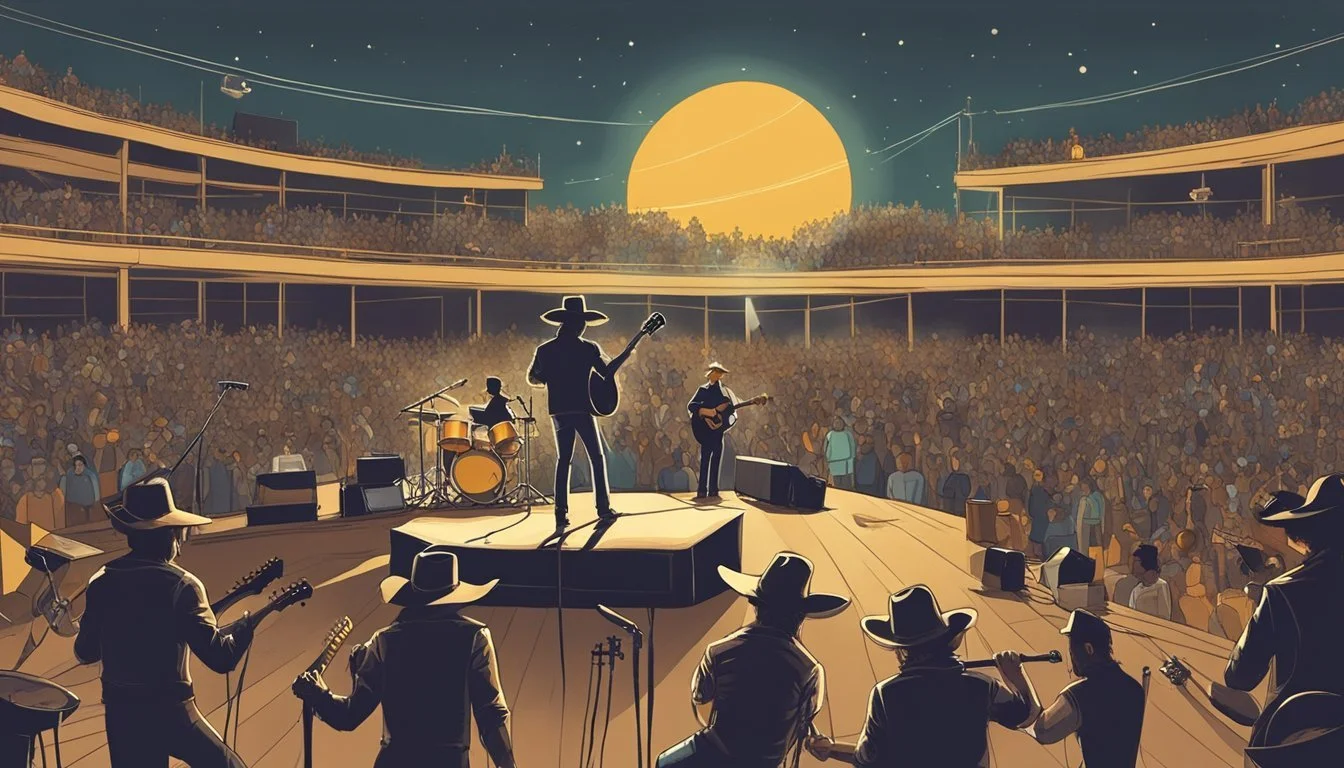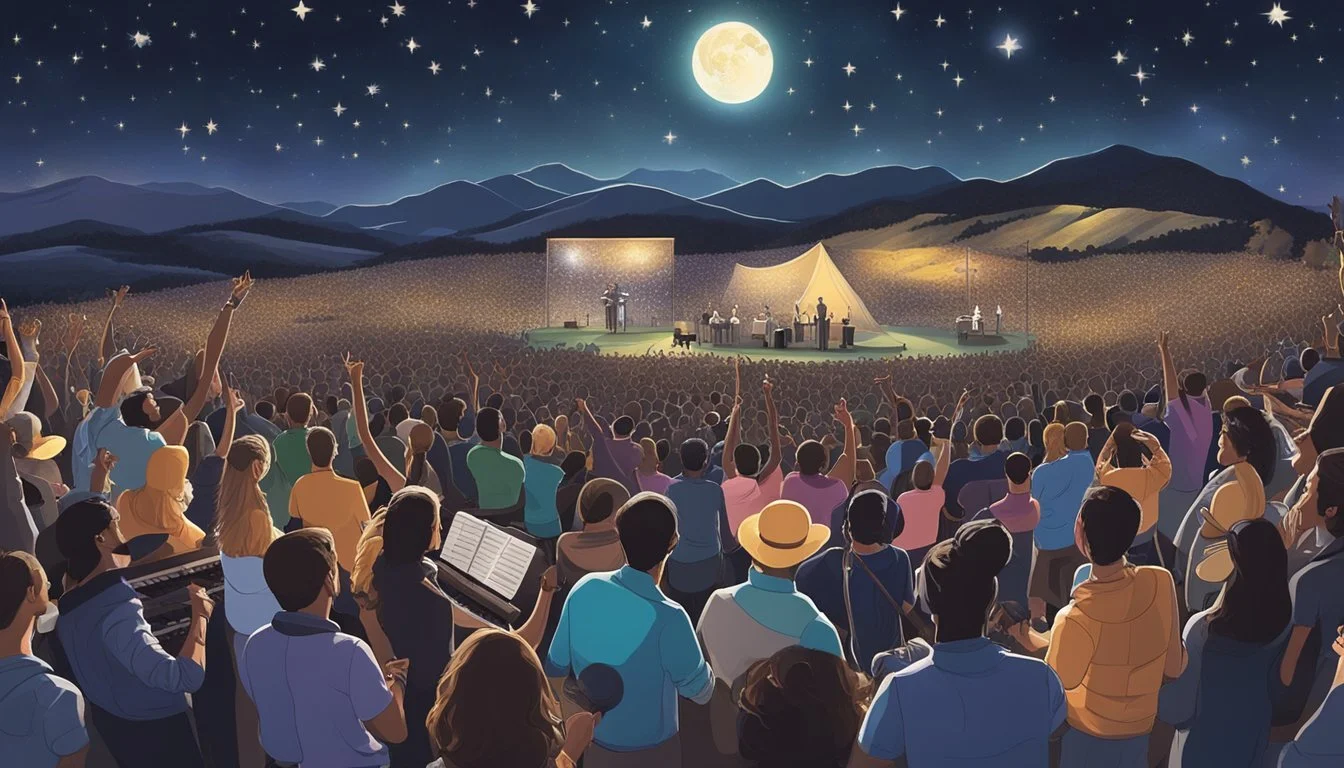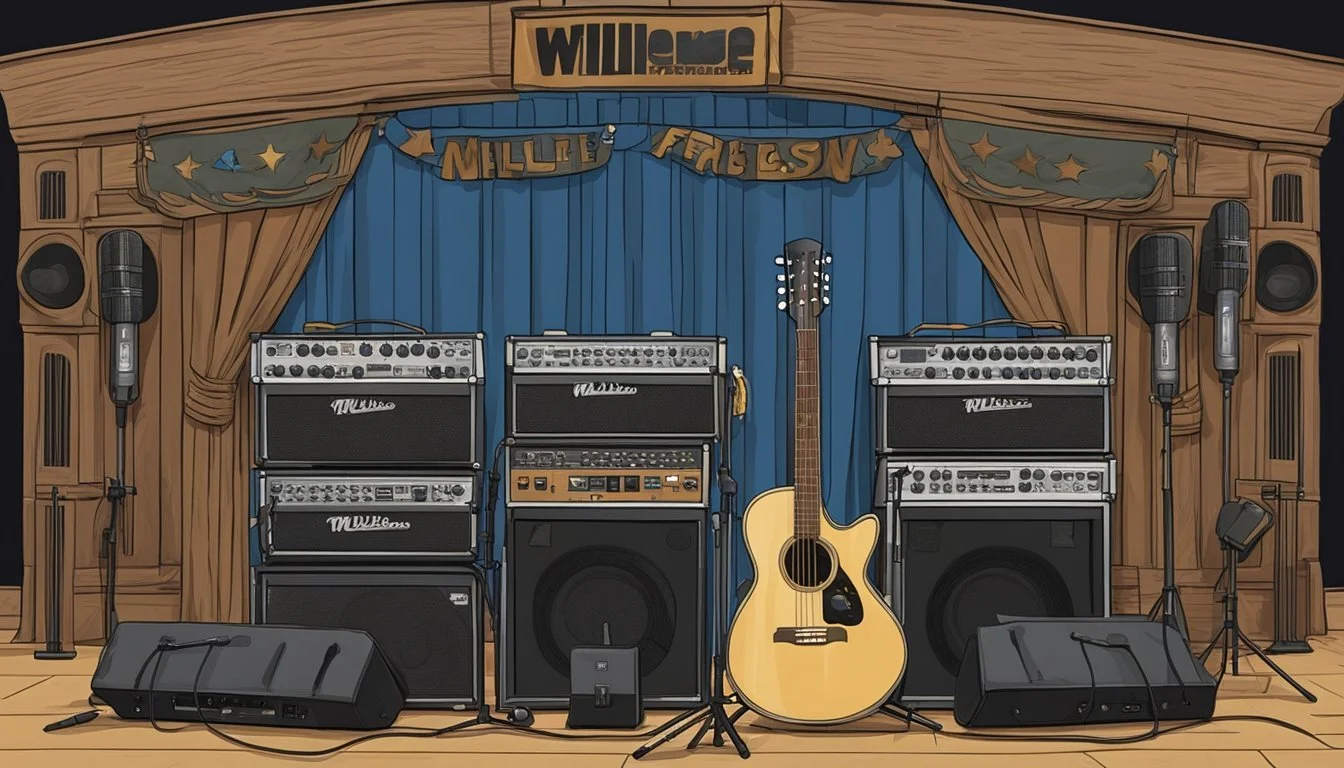The Outlaw Country Movement Explored in Willie Nelson & Family
A Deep Dive into the Genre's Roots
The "Willie Nelson & Family" docuseries offers an intimate look at the life and career of country music legend Willie Nelson. This four-part series, directed by Emmy-winning filmmakers Thom Zimny and Oren Moverman, explores Nelson's journey from his early days in Nashville to his rise as an icon of the outlaw country movement.
The outlaw country subgenre, which Willie Nelson helped shape, rejected the polished Nashville sound and embraced a more raw, authentic approach to country music. The documentary delves into Nelson's role in this musical revolution, showcasing his unique style and independent spirit that defined the movement.
Premiering on Paramount+, "Willie Nelson & Family" promises to reveal new insights into the Red Headed Stranger's life, including his battles with the IRS and his enduring influence on American music. The series features rare footage and interviews, providing a comprehensive portrait of a man who has lived and created music on his own terms for decades.
The Genesis of Outlaw Country
Outlaw country emerged as a rebellious response to the polished Nashville sound dominating country music in the late 1960s and early 1970s. It championed creative freedom and a raw, authentic style that resonated with listeners seeking something different.
Defining Outlaw Country
Outlaw country is characterized by its rejection of the conventional Nashville production style. Artists like Willie Nelson, Waylon Jennings, and Kris Kristofferson led this movement. They embraced a rougher sound, incorporating elements of rock and folk music.
Outlaw artists often wrote their own songs and controlled their recording processes. This autonomy was a stark contrast to the Nashville system, where producers and record labels held significant sway over artists' careers.
The outlaw image was cultivated through rugged aesthetics and lyrics that spoke of hard living and independence. This resonated with fans who felt disconnected from the more sanitized country music of the time.
Origins and Nashville's Influence
Nashville's dominance in country music during the 1960s set the stage for the outlaw movement. The city's studios had perfected a smooth, commercial sound known as the Nashville Sound.
While successful, this approach left little room for artistic experimentation. Many artists felt creatively stifled by the rigid expectations of Nashville producers and executives.
In response, some musicians began recording outside of Nashville. They sought creative control and the ability to incorporate diverse musical influences into their work.
This shift away from Nashville's established norms marked the beginning of outlaw country. It allowed artists to explore new sounds and themes, paving the way for a more diverse country music landscape.
Willie Nelson: The Pillar of the Movement
Willie Nelson stands as an iconic figure in outlaw country music. His distinctive voice, songwriting prowess, and rebellious spirit have shaped the genre for decades.
Biography and Early Career
Born in 1933 in Abbott, Texas, Willie Nelson began writing songs at age seven. He worked as a disc jockey and sold door-to-door encyclopedias before moving to Nashville in 1960. Nelson initially found success as a songwriter, penning hits for other artists like Patsy Cline's "Crazy."
In the early 1970s, Nelson returned to Texas and embraced a more authentic sound. He grew out his hair, adopted his signature bandana look, and released albums that challenged Nashville's polished country music norms.
Red Headed Stranger: The Album That Defined a Genre
"Red Headed Stranger," released in 1975, marked a turning point in Nelson's career and country music. The concept album told a sparse, haunting tale of a preacher on the run after killing his wife and her lover.
Columbia Records initially balked at the album's stripped-down sound. However, "Red Headed Stranger" became a critical and commercial success. It spawned the hit single "Blue Eyes Crying in the Rain" and helped establish outlaw country as a legitimate subgenre.
The album's raw emotion and storytelling prowess solidified Nelson's status as a country music innovator.
The 90th Birthday Milestone
In 2023, Willie Nelson celebrated his 90th birthday, a testament to his enduring influence and popularity. The milestone was marked by a star-studded two-day concert at the Hollywood Bowl in Los Angeles.
Artists from various genres, including Snoop Dogg, Beck, and Neil Young, paid tribute to Nelson's legacy. The event highlighted his cross-generational appeal and impact on American music as a whole.
At 90, Nelson continues to tour, record, and advocate for causes like marijuana legalization and farm aid. His longevity and continued relevance underscore his importance to the outlaw country movement and beyond.
Key Figures and Collaborators
Willie Nelson's influence extends far beyond his own music, creating a network of collaborators and friends who shaped the outlaw country movement. His partnerships and friendships with fellow artists have produced memorable duets, tours, and shared experiences that enrich the genre.
Dolly Parton and Willie Nelson's Camaraderie
Dolly Parton and Willie Nelson share a friendship spanning decades. Their musical collaborations include the duet "From Here to the Moon and Back" and appearances on each other's albums. The pair's chemistry shines through in live performances, where their mutual respect and admiration are evident.
Their shared advocacy for causes like literacy and environmental conservation strengthens their bond beyond music. Parton and Nelson's camaraderie represents the close-knit nature of the country music community, especially among its most iconic figures.
Influence of Shelby Lynne and Brenda Lee
Shelby Lynne and Brenda Lee represent different generations influenced by Willie Nelson's artistry. Lynne, known for her blend of country, soul, and rock, has cited Nelson as a major inspiration for her genre-defying approach to music.
Brenda Lee, a contemporary of Nelson's, crossed paths with him early in their careers. Her rockabilly style complemented the outlaw movement Nelson helped pioneer. Both artists have performed with Nelson at various events, showcasing the multigenerational appeal of his music and persona.
Bobby Bare and Kenny Chesney: The Extended Family
Bobby Bare, a fellow outlaw country pioneer, shares a long history with Nelson. Their collaborations on stage and in the studio helped define the outlaw sound. Bare's raw, honest songwriting aligns closely with Nelson's approach to storytelling through music.
Kenny Chesney, representing a newer generation of country stars, has openly expressed his admiration for Nelson. Chesney's participation in tribute concerts and duets with Nelson bridges the gap between traditional outlaw country and modern country pop. This relationship demonstrates Nelson's ongoing relevance and influence in the evolving country music landscape.
Cinematic Interpretations and Visual Storytelling
The Outlaw Country movement has inspired various filmmakers to capture its essence through documentaries and series. These visual narratives offer unique perspectives on the genre's icons and cultural impact.
Thom Zimny's Vision in Documentaries
Thom Zimny, known for his work on music documentaries, brings a distinctive style to the portrayal of Outlaw Country. His approach often combines archival footage with intimate interviews, creating a rich tapestry of the movement's history.
Zimny's documentaries typically feature high-contrast visuals and carefully curated soundtracks. He emphasizes the raw, rebellious spirit of Outlaw Country through his editing techniques and shot composition.
In his works, Zimny often explores the personal stories behind the music, giving viewers a deeper understanding of the artists' motivations and struggles.
Oren Moverman: Portraying the Movement
Oren Moverman's contributions to Outlaw Country storytelling focus on narrative films that capture the era's essence. His scripts often delve into the complexities of the musicians' lives and the cultural context of their music.
Moverman's style is characterized by nuanced character development and atmospheric scenes that evoke the gritty realism of the Outlaw Country lifestyle. He pays particular attention to period-accurate details in set design and costuming.
His work often highlights the tension between artistic integrity and commercial success, a central theme in the Outlaw Country narrative.
The Significance of 'Willie Nelson & Family' Docuseries
The "Willie Nelson & Family" docuseries on Paramount+ stands as a landmark in Outlaw Country visual storytelling. This series offers an in-depth look at Willie Nelson's life and career, spanning his early struggles to his iconic status.
Featuring rare footage and exclusive interviews, the docuseries paints a comprehensive picture of Nelson's influence on country music and American culture. It explores his role in shaping the Outlaw Country movement and his enduring impact on fellow artists.
The series premiered at the Sundance Film Festival, garnering critical acclaim for its intimate portrayal of Nelson's personal and professional journey. It serves as a vital historical document of Outlaw Country's evolution and legacy.
The Art and Craft of Songwriting
Songwriting forms the heart of country music, blending storytelling, authenticity, and creative collaboration. Willie Nelson's mastery of this craft has shaped the outlaw country movement and influenced generations of artists.
Storytelling Through Lyrics
Willie Nelson's songwriting excels in weaving compelling narratives. His lyrics paint vivid pictures of life's joys and struggles, resonating with listeners on a deep emotional level. Nelson draws inspiration from personal experiences, observations, and the human condition. He crafts characters and scenarios that feel real and relatable.
Nelson's songs often explore themes of love, loss, and redemption. His ability to distill complex emotions into simple, powerful phrases is a hallmark of his writing style. Songs like "Crazy" and "On the Road Again" showcase his talent for capturing universal feelings in concise, memorable lines.
The Importance of Authenticity
Authenticity is a cornerstone of Willie Nelson's songwriting approach. He writes from the heart, infusing his music with genuine emotion and personal truth. This commitment to honesty has endeared him to fans and fellow artists alike.
Nelson's authenticity shines through in his choice of subject matter and musical style. He doesn't shy away from controversial topics or unconventional song structures. His willingness to break from mainstream country norms helped define the outlaw country movement.
The raw, unvarnished quality of Nelson's lyrics and delivery creates a sense of intimacy with listeners. This authenticity has allowed him to connect with audiences across generations and musical genres.
Collaboration in the Creative Process
Willie Nelson's songwriting process often involves collaboration with other artists. These partnerships have led to some of his most memorable works and helped shape the outlaw country sound. Nelson's openness to collaboration has allowed him to explore new musical territories and stay creatively fresh throughout his career.
His work with Waylon Jennings, Kris Kristofferson, and Johnny Cash as part of The Highwaymen exemplifies the power of creative synergy. These collaborations brought together diverse talents, resulting in songs that blend multiple perspectives and styles.
Nelson's collaborative spirit extends beyond songwriting. He frequently performs and records with artists from various genres, demonstrating the universal appeal of his music and songwriting.
The Legacy and Influence of Outlaw Country
Outlaw Country reshaped the landscape of American music, leaving an indelible mark on artists and listeners alike. Its impact continues to reverberate through modern country and beyond.
Impact on Modern Country Music
Outlaw Country's influence on modern country music is profound. Artists like Willie Nelson pioneered a raw, authentic sound that challenged Nashville's polished production. This rebellious spirit paved the way for future generations to express themselves freely.
Many contemporary country stars cite Outlaw Country as a major inspiration. Its emphasis on storytelling and personal expression remains a cornerstone of the genre. The movement's DIY ethos also empowered artists to take control of their careers and creative output.
Outlaw Country's fusion of country, rock, and folk elements broadened the genre's appeal. This cross-pollination of styles continues to shape country music today, attracting diverse audiences and pushing artistic boundaries.
Overcoming Failure and Realizing Dreams
The Outlaw Country movement embodies the spirit of perseverance. Willie Nelson's journey exemplifies this tenacity. After facing numerous setbacks in Nashville, he relocated to Texas and reinvented himself.
Nelson's album "Stardust" showcases his ability to overcome industry doubts. Initially met with skepticism, the record became a massive success, proving the value of artistic vision over commercial pressure.
This resilience inspired countless artists to pursue their dreams despite obstacles. The Outlaw Country ethos taught musicians to trust their instincts and stay true to their artistic vision, even in the face of adversity.
National Treasure: A Genre's Enduring Appeal
Outlaw Country has cemented its place as a national treasure in American culture. Its authenticity and relatability resonate with listeners across generations. The genre's honest portrayal of life's struggles and triumphs strikes a chord with diverse audiences.
Icons like Willie Nelson have become cultural ambassadors, bridging gaps between different musical traditions. Their longevity and continued relevance speak to the timeless appeal of Outlaw Country's core values.
The movement's legacy extends beyond music, influencing fashion, film, and literature. Its rebellious spirit and commitment to artistic integrity continue to inspire creatives in various fields, ensuring its enduring impact on American culture.
Behind the Scenes: Production and Promotion
The creation of "Willie Nelson & Family" involved skilled producers and innovative marketing strategies. Key figures like Don Was played crucial roles in shaping the docuseries' sound and style. Meanwhile, modern digital platforms transformed how the project reached audiences.
The Role of Producers like Don Was
Don Was brought his renowned expertise to "Willie Nelson & Family." The Grammy-winning producer's involvement elevated the docuseries' musical elements. Was worked closely with Nelson to capture authentic performances and interviews.
His production techniques highlighted Nelson's distinctive voice and guitar style. Was also ensured the soundtrack complemented the narrative flow. His attention to detail enhanced the overall viewing experience.
Marketing and Distribution in the Digital Age
"Willie Nelson & Family" embraced digital marketing tactics to reach viewers. Social media campaigns built anticipation before the December 21 Paramount+ release. Short video clips and behind-the-scenes content engaged fans online.
Streaming platforms allowed for wider accessibility compared to traditional TV. This approach catered to Nelson's multi-generational fanbase. Partnerships with music streaming services promoted the accompanying soundtrack.
Taylor Sheridan, known for his work on "Yellowstone," lent his storytelling expertise to the project's promotion. His involvement added credibility and attracted a broader audience to the docuseries.





